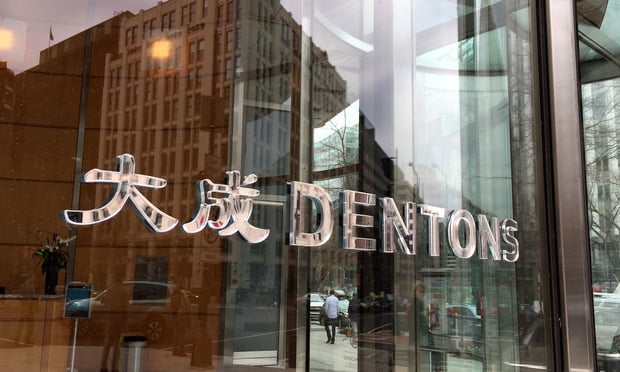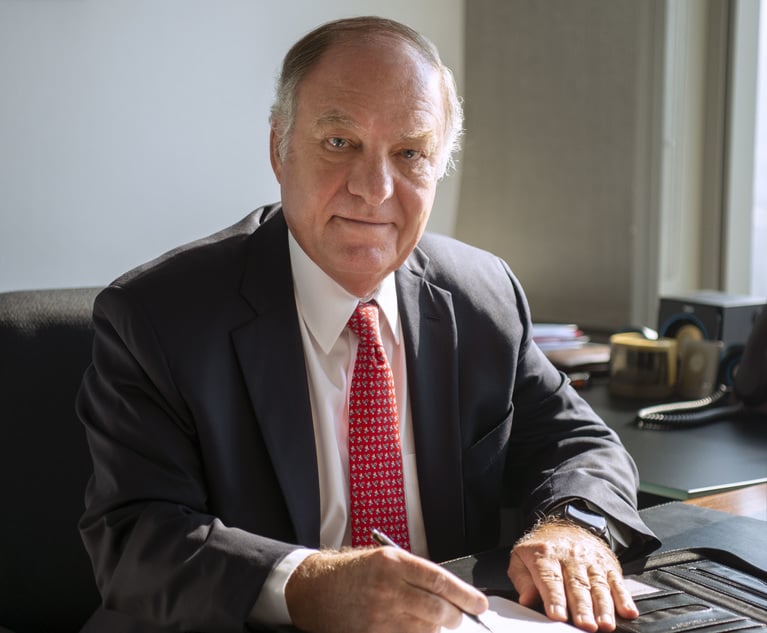Dentons Defends Its Verein Structure and Vows to Appeal $32M Malpractice Verdict
The 10,000-lawyer megafirm found its "polycentric" model facing scrutiny in a fight over client conflicts.
February 25, 2020 at 10:08 AM
6 minute read
The original version of this story was published on The American Lawyer
 Photo: Diego M. Radzinschi/ALM
Photo: Diego M. Radzinschi/ALM
Dentons is vowing to appeal a $32.3 million jury verdict against the megafirm in the United States, defending the Swiss verein structure that has helped the firm grow to enormous proportions, but that also led to Dentons' disqualification in a patent case five years ago.
The backstory begins at the U.S. International Trade Commission, where an administrative law judge disqualified Dentons in 2015 from representing client RevoLaze, rejecting the firm's contention that its U.S. branch was separate from its Canadian one. The Canadian branch had done legal work for Gap, one of the denim retailers RevoLaze sued for allegedly infringing on one of its patents.
Dentons' disqualification led to RevoLaze suing its former counsel months later. A Cuyahoga County, Ohio, jury on Feb. 13 awarded RevoLaze $32.3 million, which RevoLaze's lawyers at The Patterson Law Firm in Chicago said was the "largest legal malpractice judgment in Ohio history."
But Dentons struck a defiant tone in a statement, pointing out that the ITC later vacated the administrative law judge's findings.
"We will appeal. The verdict was simply wrong. Just as our position was vindicated on appeal by the International Trade Commission, we will be vindicated on appeal in this matter," the global law firm said in a statement.
Dentons has long touted its self-described "polycentric" model, in which the firm has expanded its footprint to more than 10,000 lawyers in 75 countries through combinations and associations with local firms, rather than formal mergers. Like several other large, global firms, it has employed a Swiss verein structure, in which the firm's finances are separated but its branding and strategy are united.
The tension between Dentons' unified brand and diffuse legal structure didn't sit well with ITC Chief Administrative Law Judge Charles Bullock. In May 2015 he agreed with Gap that Dentons US couldn't represent RevoLaze because Dentons Canada had done some work for the retailer.
Dentons argued that under its verein structure its U.S. and Canadian offices were separate entities—they did not share finances nor client files unless they were acting as co-counsel. But Bullock rejected those arguments, noting that Dentons "holds itself out to the public as a single firm."
RevoLaze had to seek new counsel as a result of Bullock's ruling. But RevoLaze found itself under the gun because it had to pay out-of-pocket for some of its legal costs. RevoLaze's patent litigation efforts against Gap and other retailers were being funded by Longford Capital, a litigation financier with offices in Chicago and Dallas, said Kristi Browne, a member of The Patterson Law Firm who represented RevoLaze.
Under its original arrangement, Longford Capital would pay for RevoLaze's legal bills at a certain rate and Dentons agreed to not go over those amounts, essentially ensuring it didn't have to pay out-of-pocket for the litigation, Browne said. But Longford Capital imposed tighter restrictions on how much could be spent on such things as discovery, and RevoLaze's new counsel didn't agree to those limits, she added.
"They would not be bound by those caps and began to bill in excess," Browne said.
The costs of litigating the case led to Gap and RevoLaze settling their ITC case in August 2015. But Dentons appealed Bullock's ruling. On April 4, 2016, RevoLaze sued Dentons and its now-chairman of its legacy patent litigation practice, Mark Hogge, in Ohio state court, accusing the firm of ignoring a conflict of interest which led to its disqualification. That forced RevoLaze to find new lawyers and settle with Gap for less.
"Up until this point, there was very little law on whether Swiss verein was one law firm or many," said Browne. "A court might not agree with this, that 'we're separate law firms,' which is where I think one of the major failings came in."
Nine days later on April 13, the ITC vacated Bullock's decision. The commission found that Bullock lacked sufficient evidence about how Dentons was structured. But because the case had already been resolved, the ITC vacated it "without deciding whether the disqualification in this investigation was appropriate."
"The commission has decided that the added delay, burdens, and expenses that would be incurred by the parties and the commission in resolving these issues are unjustified given the termination of the investigation as to all respondents," the ITC found.
The jury also did not make any determination about Dentons' structure, the law firm said. The eight-person jury found that Hogge was negligent in his representation of RevoLaze and that his negligence was the "direct cause" of the company's damages.
It wasn't a complete victory for RevoLaze, as the jury found that the company wasn't damaged due to the legal fees it had to pay out after jettisoning Dentons as its counsel or its failure to collect on license payments. Browne speculated that her client could have won more money if the jury had gone the other way.
RevoLaze sought at least $50 million in damages, less than what a Cuyahoga County jury awarded on Feb. 13.
"Importantly, the jury was not asked to make any determination regarding our firm's structure or conflicts clearance process and its decision in no way undermines the ITC's reversal of the improper initial disqualification," Dentons said. "The firm has a robust and sophisticated conflict clearing process that has enabled it to open tens of thousands of matters every year without incident."
Dentons on Thursday filed a motion to "maintain the status quo pending the outcome of the anticipated post-judgment motions and during the pendency of their stay request." The firm said there was "no question as to defendants' ability to pay the judgment, given Dentons US's resources and presence throughout the United States."
Read More
Ex-Client Sues Dentons Over ITC Case
Dentons' Verein Status Doesn't Shield It from a Conflict
This content has been archived. It is available through our partners, LexisNexis® and Bloomberg Law.
To view this content, please continue to their sites.
Not a Lexis Subscriber?
Subscribe Now
Not a Bloomberg Law Subscriber?
Subscribe Now
NOT FOR REPRINT
© 2025 ALM Global, LLC, All Rights Reserved. Request academic re-use from www.copyright.com. All other uses, submit a request to [email protected]. For more information visit Asset & Logo Licensing.
You Might Like
View All
Carey Abogados’ Senior Partner Becomes New Head of IBA, First Chilean to Assume Role of President

Goodwin Hires Quinn Emanuel Antitrust Partner to Launch Brussels Office
3 minute read
Claus von Wobeser: Mexico's ‘Godfather of Arbitration’ Becomes Firm’s Honorary Chair

Jenner & Block Expands London Team with Baker McKenzie Hire to Lead New Practice Area
2 minute readLaw Firms Mentioned
Trending Stories
- 1Family Court 2024 Roundup: Part I
- 2In-House Lawyers Are Focused on Employment and Cybersecurity Disputes, But Looking Out for Conflict Over AI
- 3A Simple 'Trial Lawyer' Goes to the Supreme Court
- 4Clifford Chance Adds Skadden Rainmaker in London
- 5Latham, Kirkland and Paul Weiss Climb UK M&A Rankings
Who Got The Work
J. Brugh Lower of Gibbons has entered an appearance for industrial equipment supplier Devco Corporation in a pending trademark infringement lawsuit. The suit, accusing the defendant of selling knock-off Graco products, was filed Dec. 18 in New Jersey District Court by Rivkin Radler on behalf of Graco Inc. and Graco Minnesota. The case, assigned to U.S. District Judge Zahid N. Quraishi, is 3:24-cv-11294, Graco Inc. et al v. Devco Corporation.
Who Got The Work
Rebecca Maller-Stein and Kent A. Yalowitz of Arnold & Porter Kaye Scholer have entered their appearances for Hanaco Venture Capital and its executives, Lior Prosor and David Frankel, in a pending securities lawsuit. The action, filed on Dec. 24 in New York Southern District Court by Zell, Aron & Co. on behalf of Goldeneye Advisors, accuses the defendants of negligently and fraudulently managing the plaintiff's $1 million investment. The case, assigned to U.S. District Judge Vernon S. Broderick, is 1:24-cv-09918, Goldeneye Advisors, LLC v. Hanaco Venture Capital, Ltd. et al.
Who Got The Work
Attorneys from A&O Shearman has stepped in as defense counsel for Toronto-Dominion Bank and other defendants in a pending securities class action. The suit, filed Dec. 11 in New York Southern District Court by Bleichmar Fonti & Auld, accuses the defendants of concealing the bank's 'pervasive' deficiencies in regards to its compliance with the Bank Secrecy Act and the quality of its anti-money laundering controls. The case, assigned to U.S. District Judge Arun Subramanian, is 1:24-cv-09445, Gonzalez v. The Toronto-Dominion Bank et al.
Who Got The Work
Crown Castle International, a Pennsylvania company providing shared communications infrastructure, has turned to Luke D. Wolf of Gordon Rees Scully Mansukhani to fend off a pending breach-of-contract lawsuit. The court action, filed Nov. 25 in Michigan Eastern District Court by Hooper Hathaway PC on behalf of The Town Residences LLC, accuses Crown Castle of failing to transfer approximately $30,000 in utility payments from T-Mobile in breach of a roof-top lease and assignment agreement. The case, assigned to U.S. District Judge Susan K. Declercq, is 2:24-cv-13131, The Town Residences LLC v. T-Mobile US, Inc. et al.
Who Got The Work
Wilfred P. Coronato and Daniel M. Schwartz of McCarter & English have stepped in as defense counsel to Electrolux Home Products Inc. in a pending product liability lawsuit. The court action, filed Nov. 26 in New York Eastern District Court by Poulos Lopiccolo PC and Nagel Rice LLP on behalf of David Stern, alleges that the defendant's refrigerators’ drawers and shelving repeatedly break and fall apart within months after purchase. The case, assigned to U.S. District Judge Joan M. Azrack, is 2:24-cv-08204, Stern v. Electrolux Home Products, Inc.
Featured Firms
Law Offices of Gary Martin Hays & Associates, P.C.
(470) 294-1674
Law Offices of Mark E. Salomone
(857) 444-6468
Smith & Hassler
(713) 739-1250








